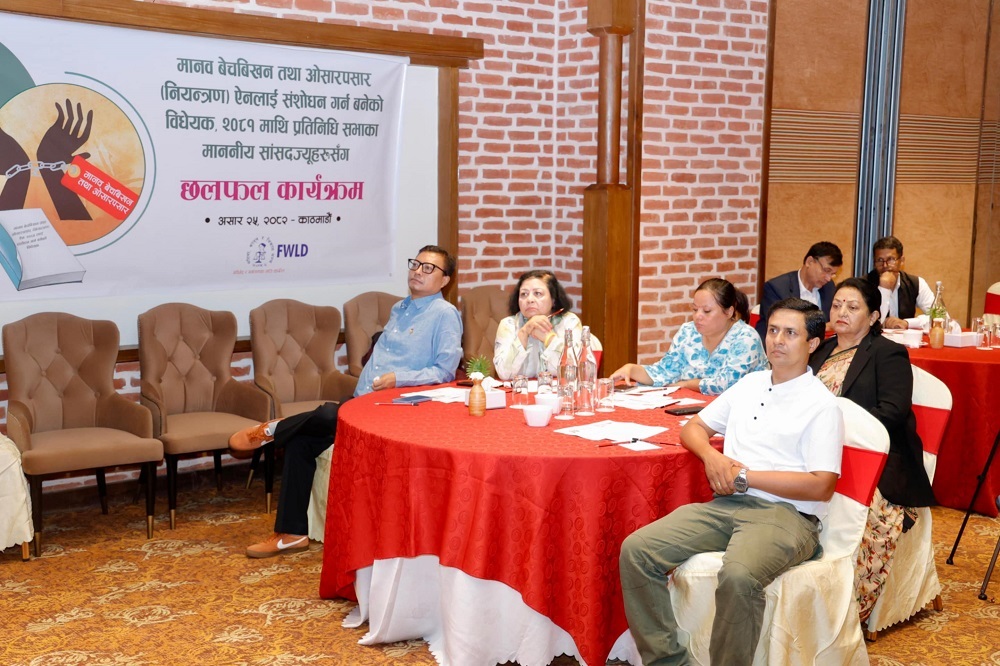
Kathmandu — The revised Human Trafficking and Transportation (Control) Bill has been criticized for being incomplete and not aligned with contemporary issues and international standards. During a discussion with Members of Parliament (MPs), stakeholders called for urgent and comprehensive revisions to address evolving forms of trafficking and ensure alignment with international protocols.
Kiran Kumar Sah, Chairperson of the Women and Social Affairs Committee, stressed the importance of updating Nepal’s anti-trafficking laws to reflect modern realities. Speaking at a discussion organized by Forum for Women, Law and Development (FWLD), he said, “Human trafficking is a serious human rights violation in Nepal. Women and girls, in particular, fall prey due to poverty, illiteracy, unemployment, gender inequality, and open border movement.”
He highlighted the misuse of the open Nepal–India border, where women are trafficked under false promises of marriage, employment, or education to India, Gulf countries, and Malaysia. Sah further pointed out that weak law enforcement, lack of victim-friendly services and rehabilitation mechanisms, poor border surveillance, impunity for traffickers, and challenges in evidence collection are major hurdles in tackling human trafficking.
During the discussion, FWLD Executive Director Advocate Sabin Shrestha clarified that human trafficking and human smuggling are distinct issues, though often misunderstood as the same. “Even if they sound similar, trafficking and smuggling are different and must be legally defined separately,” he urged MPs.
Shrestha acknowledged some positive elements in the proposed amendment to the 2007 Human Trafficking and Transportation (Control) Act, but said significant changes were still needed. He emphasized that Nepal is not only a source but also a destination for trafficking, requiring clear legal provisions to ensure international cooperation.
He also called on female MPs to form a collective position on issues such as trafficking of children, organ trade, and surrogacy, and present it in Parliament. Shrestha advocated for a separate law on smuggling, which has been loosely included under trafficking, and emphasized the need for separate legal provisions addressing violence in the entertainment sector and for shelters (rehabilitation, family reunification, and foster care systems).
MP Sushila Sirpali Thakuri pledged to lobby for detailed clause-wise discussion of the bill in the relevant parliamentary committee. MPs noted that the current bill includes provisions allowing victims to file complaints through diplomatic missions abroad, freezing of the perpetrator’s property and passport, and increased compensation.
Lawmakers including Laxmi Tiwari, Saraswati Bajimaya, Roshan Karki, Surya Dhakal, and Ishwori Gharti Magar also shared their perspectives on the bill, expressing the need for broader reforms.
Advocate Binu Lama highlighted the objective of the discussion, stating that the bill should be amended in line with the Palermo Protocol, to which Nepal is a signatory. She reminded MPs that as a state party to international treaties, Nepal has a responsibility to update its domestic laws accordingly.
The discussion was chaired by FWLD President Geeta Aryal and moderated by Binod Chandra Devkota.